
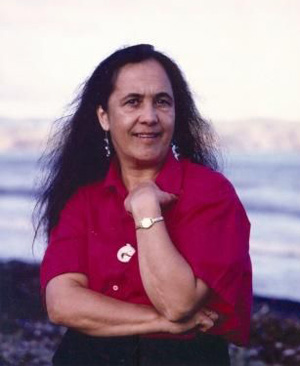 Patricia Grace happened to me by accident. I spent a few months in New Zealand, and decided to read
the locals while I was there. I saw Grace's books in a lot of different places, but nothing about
them made them stand out. My interest was raised slightly when I discovered that Grace was Mäori,
but it wasn't until I found myself bookless in a tiny town with no good bookshops that the lack of
choice pushed me to pick up Potiki without, it has to be noted, high expectations.
Patricia Grace happened to me by accident. I spent a few months in New Zealand, and decided to read
the locals while I was there. I saw Grace's books in a lot of different places, but nothing about
them made them stand out. My interest was raised slightly when I discovered that Grace was Mäori,
but it wasn't until I found myself bookless in a tiny town with no good bookshops that the lack of
choice pushed me to pick up Potiki without, it has to be noted, high expectations.
Within a few pages of starting Potiki I was mesmerized by Grace's language. As in all of her books, Mäori words are sprinkled liberally throughout the text. Most of the editions I have read do not include glossaries, but initially unfamiliar terms quickly become meaningful without translation. The effect is to create a new hybrid language, analogous to the 'Hinglish' used by Indian writers. However, Grace's new language is earthier, with its flat vowels and angular consonants, and she deftly uses it to make her sentences into gentle sledgehammers. Her prose is rarely ornate, but it is used effectively to both describe and mirror the lives she is observing.
Much of Grace's work concerns clashes between Mäori and white New Zealanders (Pakeha), and her stories often make uncomfortable reading. The Pakeha are portrayed as exploiters and abusers of the land, whereas the Mäori are fated to live as part of it or perish. This cultural difference underpins many of Grace's narratives. Some describe direct confrontations between Mäori and pakeha, such as a struggle over land usage between resident and outsiders (Potiki), or racial abuse ("Going for the Bread" and "The Hills", short stories from Electric City). However, the assault on Mäori values is often subtler. Mäori children are forced to adopt Christian names in schools, so that Mata becomes May, Makareta becomes Marguerita (Cousins) or Ripeka becomes Linda (Mutuwhenua), eroding their Mäori identities from an early age. The title story of Dream Sleepers and Other Stories describes Greek history being taught in schools under the heading 'Our Heritage', to the confusion of many of the Mäori pupils. In "Baby No-Eyes" the Mäori people find that even their own bodies are possessions to be exploited (Grace has used the word 'mined') when doctors steal tissues from dead babies for genetic studies. The book is based on a real-life incident.
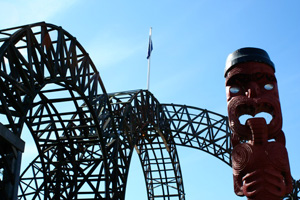 A constant refrain in Grace's books, stated explicitly in Potiki, is that 'the land does
not belong to the people, the people belong to the land'. This is key to understanding Grace's
fear for the Mäori. Her characters are constantly being told that they could live more like Pakeha,
to end their oppression by joining the 'modern world'. As they become dislocated from their land,
many begin to see their own culture as foolish or embarrassing. Grace's first short story
collection, Waiariki, contains many pieces on this theme. One of my favourites, "Parade",
sees a Mäori woman watching a parade that includes a Mäori contingent. In her eyes, the Mäori
have been transformed into clowns, performing their rituals for the benefits of tourists and
to the derision of locals. This theme is explored to its fullest in Cousins. In the novel,
three members of the same family find themselves pushed away from their heritage by forces that
include a Pakeha education, oppressive and reactionary Mäori practices and the attractions of
boys and Rock and Roll. The cities they look to for escape are presented as strange places,
metallic and inorganic, the asphalt beneath their feet preventing any relationship between the
land and its inhabitants. In many of Grace's books transplanted characters become ghost-like
in their new worlds. This is exemplified by Mata (Cousins), perhaps Grace's most tragic character.
Educated by Christian Pakeha to treat Mäori with disgust and contempt, she becomes little more
than a hollow shell, rootless and without any identity. Her story is haunting and harrowing,
beautifully told, and possibly the finest piece of writing about the costs of cultural dislocation
I have ever read.
A constant refrain in Grace's books, stated explicitly in Potiki, is that 'the land does
not belong to the people, the people belong to the land'. This is key to understanding Grace's
fear for the Mäori. Her characters are constantly being told that they could live more like Pakeha,
to end their oppression by joining the 'modern world'. As they become dislocated from their land,
many begin to see their own culture as foolish or embarrassing. Grace's first short story
collection, Waiariki, contains many pieces on this theme. One of my favourites, "Parade",
sees a Mäori woman watching a parade that includes a Mäori contingent. In her eyes, the Mäori
have been transformed into clowns, performing their rituals for the benefits of tourists and
to the derision of locals. This theme is explored to its fullest in Cousins. In the novel,
three members of the same family find themselves pushed away from their heritage by forces that
include a Pakeha education, oppressive and reactionary Mäori practices and the attractions of
boys and Rock and Roll. The cities they look to for escape are presented as strange places,
metallic and inorganic, the asphalt beneath their feet preventing any relationship between the
land and its inhabitants. In many of Grace's books transplanted characters become ghost-like
in their new worlds. This is exemplified by Mata (Cousins), perhaps Grace's most tragic character.
Educated by Christian Pakeha to treat Mäori with disgust and contempt, she becomes little more
than a hollow shell, rootless and without any identity. Her story is haunting and harrowing,
beautifully told, and possibly the finest piece of writing about the costs of cultural dislocation
I have ever read.
Grace's books do not deliver trite messages about the oneness of mankind. The differences she sees between Mäori and Pakeha are real and run deep, and her solutions to clashes of culture are often challenging. All of her novels, however, contain the possibility of reconciliation. Many of her characters find ways of living Mäori lives in modern New Zealand. Ripeka (Mutuwhenua) marries a Pakeha man, but ensures that her daughter will grow up Mäori. In Cousins, Mata, Makareta and Missy all return home from the Pakeha world with their own views of what it means to be Mäori, but with the spirit of their culture preserved in their ways of life. In Potiki, the protesters against the developers are both Mäori and Pakeha, working together. Her messages about race and culture are not always easy to swallow, but they are tempered with an uplifting belief in the feasibility of a functioning multicultural society. The world Grace writes about is therefore a ruthlessly honest mix of the ugliness and the beauty that characterises humanity, something that makes her books easily accessible regardless of the reader's background.
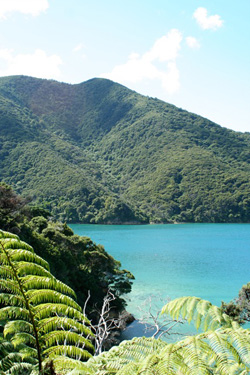 If Grace's books were simply here-and-now accounts of cultural differences between the Mäori and
Pakeha worlds I would still recommend them for the brilliance of the writing alone. However, there
is a further depth to her stories, a transcendental quality that contrasts sharply with their
often mundane settings. She uses Mäori mythology and folklore to give permanence to her characters'
fleeting lives by positioning them as part of Mäori mythology. Myths are often used as starting
points for narratives. Dogside Story begins with the story of two sisters arguing over a
canoe, which becomes the creation myth for the town of Dogside. In The Sky People, my
favourite of her short story collections, traditional stories are re-lived by modern Mäori in
New Zealand's urban landscape. The 'sky people' of the title are both historical and contemporary,
multiple representatives of a single Mäori unity stretching back centuries. It is in Potiki,
however, that Grace's views of the nature and importance of storytelling becomes most apparent.
She has said that it was written to deliberately mirror a whaikerero, a traditional formal speech
given at social gatherings. The narrative begins with a description of a carver. The carver is not
described as being the creator of his carvings. Instead his role is to expose them, releasing them
from their hiding place in the wood. So it is for Grace's stories. For her they are entities with
an existence beginning long before she writes them down, long before she thinks of them.
In the book she describes her characters as 'already old when they were born', because their
lives are manifestations of stories, and stories are older than everything, and will be all that is
left when everything else has gone. Potiki is therefore not a story about people; it is instead a
story about stories, stories that can become people, but that will always remain stories. It is a
book that has a simplicity that can break your heart and a complexity that can dazzle your mind and,
for me, stands as Patricia Grace's towering achievement.
If Grace's books were simply here-and-now accounts of cultural differences between the Mäori and
Pakeha worlds I would still recommend them for the brilliance of the writing alone. However, there
is a further depth to her stories, a transcendental quality that contrasts sharply with their
often mundane settings. She uses Mäori mythology and folklore to give permanence to her characters'
fleeting lives by positioning them as part of Mäori mythology. Myths are often used as starting
points for narratives. Dogside Story begins with the story of two sisters arguing over a
canoe, which becomes the creation myth for the town of Dogside. In The Sky People, my
favourite of her short story collections, traditional stories are re-lived by modern Mäori in
New Zealand's urban landscape. The 'sky people' of the title are both historical and contemporary,
multiple representatives of a single Mäori unity stretching back centuries. It is in Potiki,
however, that Grace's views of the nature and importance of storytelling becomes most apparent.
She has said that it was written to deliberately mirror a whaikerero, a traditional formal speech
given at social gatherings. The narrative begins with a description of a carver. The carver is not
described as being the creator of his carvings. Instead his role is to expose them, releasing them
from their hiding place in the wood. So it is for Grace's stories. For her they are entities with
an existence beginning long before she writes them down, long before she thinks of them.
In the book she describes her characters as 'already old when they were born', because their
lives are manifestations of stories, and stories are older than everything, and will be all that is
left when everything else has gone. Potiki is therefore not a story about people; it is instead a
story about stories, stories that can become people, but that will always remain stories. It is a
book that has a simplicity that can break your heart and a complexity that can dazzle your mind and,
for me, stands as Patricia Grace's towering achievement.
I started by saying that Patricia Grace happened to me by accident. I hope I can help her happen
to other people on purpose. Three years after reluctantly picking up Potiki, she has become
one of my favourite writers. I have read and re-read her books, something I rarely feel compelled
to do with other authors. Her prose delivers its difficult messages with clarity and beauty, and
the fact that her cultural perspective is rarely represented in literature means that, for me,
her writing is both unique and important. Despite being well known in New Zealand for many years,
and being the recipient of some major international praise, most notably the 2008 Neustadt Prize,
she is not nearly as widely read as she deserves to be. For me, she remains one of world
literature's underrated gems, and the author of some of the most startling, challenging and beautiful
books written in the last few decades.
Photo Credit: "Maori statue at the entrance to the Rotorua Museum, New Zealand" and "Landscape: Marlborough sounds" by Andrew Barnes.
Download this page as a pdf
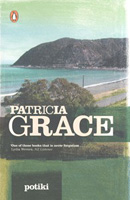
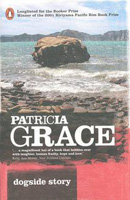
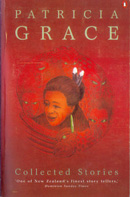
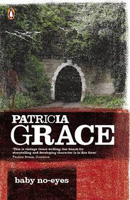
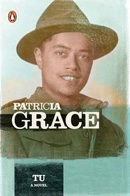
Note: Collected Stories: Patrica Grace, available through Penguin NZ, collects all of the work in Patricia Grace's first three books of short stories mentioned in this article.
For more information on Patricia Grace, please visit her page on the New Zealand Book Council's website.